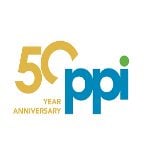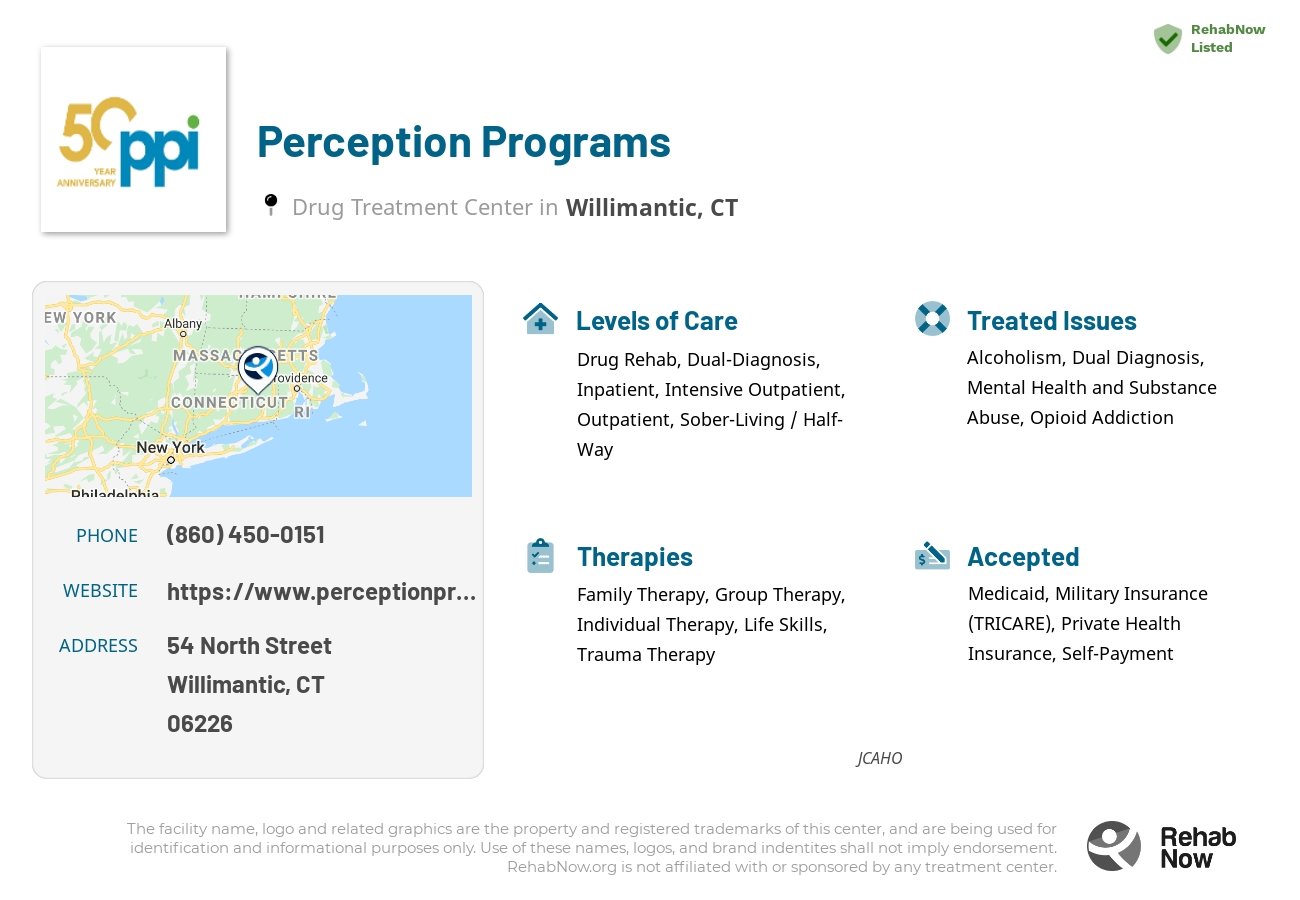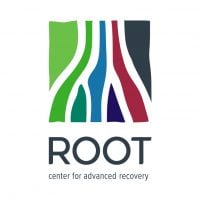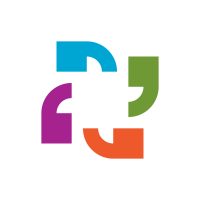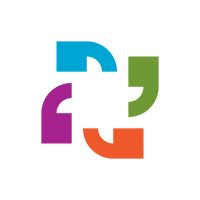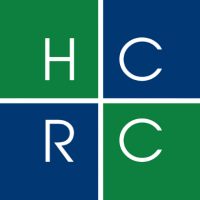Perception Programs
Drug Rehab Center in Willimantic, Connecticut
Perception Programs, Inc. is a private, not-for-profit facility in Connecticut that provides evidence-based, comprehensive and person-centered treatment for addiction and substance abuse, including individual and group counseling, interactive therapeutic activities, medication-assisted treatment, and family support services.
About Perception Programs in Connecticut
Perception Programs, located in Willimantic, Connecticut, stands out for their comprehensive treatment of alcoholism, dual diagnosis, opioid addiction, and other drug-related addictions. They emphasize a holistic approach to recovery, integrating traditional and innovative treatments to support both the individual and the community. This facility not only focuses on helping clients achieve sobriety but also on maintaining long-term wellness.
Accredited by the Joint Commission on Accreditation of Healthcare Organizations (JCAHO), Perception Programs is recognized for its high standards in behavioral health care. They offer a range of programs from inpatient care and detox to intensive outpatient support and personalized aftercare, ensuring each client receives the guidance needed for lasting recovery.
- Holistic Approach to Recovery: Perception Programs utilizes a combination of evidence-based and clinical treatments tailored to individual needs.
- Comprehensive Dual Diagnosis Treatment: Specialized support for individuals dealing with both addiction and mental health issues.
- Innovative Opioid Clinic: Offering cutting-edge medication-assisted treatment options for opioid addiction.
Perception Programs addresses a variety of issues, including alcoholism, opioid addiction, and dual diagnosis, employing methods such as cognitive-behavioral therapy, family therapy, and 12-step support across different levels of care. Their focus on aftercare and relapse prevention equips clients with the tools for sustained sobriety.
Genders
Ages
Modality
Additional
Accreditations

JCAHO
Conditions and Issues Treated
Treatment for opioid addiction is best made with the help of medical professionals who are experienced in dealing with these types of drugs. This treatment can involve medications, exercise, behavioral therapy, and counseling sessions. It is important to note that the effectiveness of treatments for opioid addiction vary, so it is vital to research which treatment options are suitable for each individual.
Many people who struggle with opioid addiction need to attend specific programs like methadone , Suboxone or Vivitrol clinics.
These types of programs will provide the patient with legal, prescription medications that can help them overcome their cravings for illegal opioids like heroin or fentanyl . If the patient has a chronic condition like Hepatitis C, they must undergo treatment before they can begin taking these medications.
Individuals who are addicted to drugs and/or alcohol often have one or more co-occurring mental health disorders. Addressing both the addiction and the mental health problems at facilities like Perception Programs can be very beneficial for these individuals.
Common mental health conditions that often co-occur with addiction include:
- Anxiety Disorders – People with drug and alcohol problems often suffer from anxiety disorders such as panic disorder, obsessive-compulsive disorder, social anxiety disorder, and generalized anxiety disorder.
- Depression – One of the most common mental illnesses co-occurring with addiction is major depressive disorder.
- Attention-deficit hyperactivity disorder (ADHD) – Many people with drug and alcohol problems also suffer from ADHD.
- Bipolar Disorder – People with bipolar disorder are more likely to suffer from drug and alcohol problems than the general population, and vice versa.
Levels of Care Offered
This center offers a variety of custom treatment tailored to individual recovery. Currently available are Drug Rehab, Dual-Diagnosis, Inpatient, Intensive Outpatient, Outpatient, Residential, Sober-Living / Half-Way, with additional therapies available as listed below.
Inpatient recovery offers individual therapy, groups, and family therapy. The length of inpatient addiction treatment depends on the addict and their addiction. Inpatient rehab is a costly drug treatment, costing anywhere from $30k- to $60k. However, insurance often offers help in covering these costs.
An intensive outpatient treatment program, or IOP, is set up for those struggling with an addiction to begin the recovery process. However, the patient will not live at the facility during treatment.
IOP involves patients coming in and out of a medical office building regularly to receive therapy and other services while continuing their life outside of these visits.
IOP is a step up from drug detoxification or alcohol detox. However, it’s still considered a phase of recovery rather than the ultimate goal. There are many rehabs and treatment facilities available to patients in need of IOP.
Outpatient treatment can be considered the lowest intensity level of addiction treatment in Willimantic, CT. It is ideal for early phase addiction or lower intensity addictions. Perception Programs peer group support, 12-step programs, and individual counseling are likely to be involved.
Sober living homes are transitional houses for recovering addicts who need more structure than they would receive in an aftercare program. Specific rules and regulations are enforced in these homes, which are beneficial for people who need a greater degree of structure than other types of treatment.
Sober living home options include:
- Live-in managers – might be beneficial to people who do not have a support system in place at home, or who experience high levels of stress between work and home life.
- House managers – House managers are beneficial for people who do not have a strong social network to rely on, or who are concerned about relapse in their daily lives.
- House parents – House parents are beneficial to people who reside in areas without a strong aftercare program for support.
Residential treatment programs are those that offer housing and meals in addition to substance abuse treatment. Rehab facilities that offer residential treatment allow patients to focus solely on recovery, in an environment totally separate from their lives. Some rehab centers specialize in short-term residential treatment (a few days to a week or two), while others solely provide treatment on a long-term basis (several weeks to months). Some offer both, and tailor treatment to the patient’s individual requirements.
Therapies & Programs
Individual therapy is ideal for addicts who want to focus on themselves. It can also be helpful for those whose withdrawal symptoms are exacerbated by the presence of other people.
Benefits of individual therapy are:
- Access to a personalized treatment plan that focuses on the individual needs of the addict
- More privacy during treatment sessions
- Better personal development through introspection
- Increased self-awareness regarding addictive tendencies in order to avoid relapse
- Greater potential for a long-term recovery plan
- Receiving professional advice and detox assistance from medical staff
Family therapy can help you and your family deal with old issues that may trigger substance abuse. The idea behind family therapy for drug addiction is that you are never fully healed from substance abuse until you’ve healed your relationship with your family, too. To get sober, you need to find a different way to cope with the pain in your life.
This is when a group of people in various stages of recovery meet up and discuss their experiences, triggers, successes, failures, and even alternative therapies! Unlike support groups where everyone already knows each other, group therapy is conducted along side outpatient or inpatient treatment at Perception Programs.
Trauma therapy is a clinical process that helps individuals deal with mental stress often caused by traumatic events. The therapist helps the person identify, understand and work through the problem. This is done with the help of talking about it in group or one-on-one counseling sessions.
Therapists use relaxation, role-playing, art, and music to help the person open up about what is bothering them. Some examples include:
- Talking about the traumatic event and how it affected them.
- Helping those who have PTSD to deal with their nightmares and recurring memories.
- Working with individuals to resolve the issues triggering the stress, whether seeing someone who reminds them of what happened or feeling helpless.
The individual is also encouraged to help others that are struggling with similar problems. This often helps them feel empowered and gives them hope.
Trauma therapy is not for everyone; it is usually reserved for people who have recently experienced a traumatic event and struggle to get over it. It is generally done for children, teenage victims of sexual assault, and war veterans.
CBT is a psychotherapy approach and method. [ws-nap-name] people to examine how their thoughts, including habitual harmful and inaccurate thinking, affect their actions. CBT is based on the idea that rigid, inflexible thinking leads to poor stress management, which leads to emotional distress.
Similarly, CBT helps people identify and change negative behaviors. It makes you question your perceptions and ask if they are realistic. CBT asks people to examine their behaviors and emotional responses and how they affect their lives. CBT aims to change people’s thinking and behavior to lead a more balanced and healthy life.
Moreover, CBT has been shown to reduce anxiety disorders, depression, and symptoms associated with harmful thoughts or actions.
Those struggling with addiction can benefit from learning certain life skills. It is not as simple as quitting drinking or taking drugs and thinking that the hard part is over. Being sober means living a whole new way of life. Many recovering addicts have found that they need to develop talents like time management, organization, communication skills, socialization skills, and self-esteem to make their life in sobriety work, Perception Programs is here to help with that.
Payment Options Accepted
For specific insurance or payment methods please contact us.
Is your insurance accepted?
Ask an expert, call (888) 674-0062
Perception Programs Associated Centers
Discover treatment facilities under the same provider.
- Perception House - Women's Residential Program in Willimantic, CT
- New Perceptions in Danielson, CT
- Perception Programs in Danielson, CT
- Perception Programs – Outpatient in Willimantic, CT
- Perception House in Willimantic, CT
Learn More About Perception Programs Centers
Additional Details
Specifics, location, and helpful extra information.
Willimantic, Connecticut 6226 Phone Number(860) 450-0151 Meta DetailsUpdated April 15, 2024
Staff Verified
Perception Programs Patient Reviews
There are no reviews yet. Be the first one to write one.
Willimantic, Connecticut Addiction Information
Connecticut has a higher rate of substance abuse and addiction than the national average. The state ranks in the top 10 in the country for illicit drug dependence among those ages 18 to 25. In 2010, there were 9,211 people admitted to an alcohol treatment facility for alcohol abuse combined with a secondary drug. Connecticut ranked fifth in the United States of America for the number of fatalities involving drunk driving in 2014.
The drug addiction problem in Willimantic, Connecticut, is relatively severe. Out of 18,000 people, over 6,000 people in the Willimantic are addicted to drugs. The rates of addiction and abuse are high, and the problem is only getting worse. Drug addiction treatment in Willimantic, Connecticut, can vary depending on the facility, but typically, it will involve counseling, therapy, and medication.
Treatment in Nearby Cities
- Lebanon, CT (5.3 mi.)
- Essex, CT (27.0 mi.)
- New Haven, CT (46.4 mi.)
- Stratford, CT (60.1 mi.)
- Wallingford, CT (36.2 mi.)
Centers near Perception Programs
The facility name, logo and brand are the property and registered trademarks of Perception Programs, and are being used for identification and informational purposes only. Use of these names, logos and brands shall not imply endorsement. RehabNow.org is not affiliated with or sponsored by Perception Programs.
